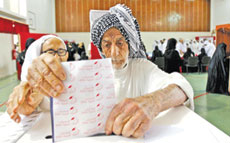
|
 |
 |
|
|
|
|
|
|
|
|
|
|
|
|
|
|
|
|
|
|
|
|
|
|
Emerging Democracy and Civil SocietyEmerging democracies are faced with many challenges, one of which is very much related to the newly born experience itself, which makes it difficult to predict limits and anticipate challenges and difficulties. However, these democracies gradually learn from their own experiences and then progress very quickly after initial fears and caution subside. Emerging democracies obviously present a young and preliminary experience, and not a fully mature one. Moreover, the experience of civil societies themselves in these new democracies can only be described as young and immature as well. It is difficult for those who have become accustomed to working in secrecy and oppression to know exactly how to take advantage
It is important that civil society institutions have a clear understanding of the grounds on which they are working and the political system with which they are dealing, and to learn how to aid the latter step by step towards the public interest. Criticism of the Government should take place within a framework of awareness and understanding, allowing it to be regulated and directed to serve its main purpose, which is the improvement and development of political performance; and just as civil societies are required to be more considerate of the special circumstances of this political transformation, so the Government should also take into consideration the fact that civil society organizations, including political ones, make mistakes and that they are also in need of help and guidance. Currently, we are all at the stage of making mistakes which are unintentional, and come as a result of the nature of the pre-reform period and the lack of expertise, experience and trust between reform advocates in both the Regime and civil societies. Thus, whoever wishes to deal with the Regime as a single mature block, responsible for the behaviour of all its officials, should in turn expect to be held accountable for all his mistakes, and according to the same standards. In this case we are left with two undesirable scenarios: the Regime accuses civil society organizations of committing breaches and drags them to courts, whilst these organizations defame the Regime at every opportunity and blame the head of the authority instead of certain institutions or officials. This is exactly what will lead us to clashes, prolong the transition period, hinder reform and cause tension on the streets. At the beginning of the reform period we witnessed several officials’ inability to adapt to the new situation, or take criticism well or even face the media and address the public adequately. The Government quickly noticed these shortcomings and responded by insisting that a number of its officials undertake training courses on how to deal with criticism, media and civil societies etc. On the other hand, civil societies, while multiplying on the surface, are not all professional in their work, and some are constantly making mistakes, which do not necessarily stem from ill will, but are due to the lack of experience and awareness of the new situation. Even today we still hear some immature statements and attitudes. No one can deny the existence of shortcomings on either side, and, therefore, we all need to be more considerate towards one another, to cooperate, learn, mature and gain experience. Not all officials or even all the representatives in Parliament are mature enough, and human rights societies are not infallible either. So are we all equal? And is it acceptable for us to turn a blind eye to each others’ misdeeds? Surely not, for wrong acts remain wrong and we should draw attention to them, but in a constructive way and not for the purpose of scoring points against each other as some might do. Obviously, some official government institutions as well as civil societies are still immature and this is something that international organizations should take into account when dealing with the political, security and human rights situation in Bahrain. This consideration can distance the reform project from political adversary and the immediate political interests in the political, human rights and legislative fields, and would make it possible to achieve a better political atmosphere in order to develop the political system as well as human rights. |
